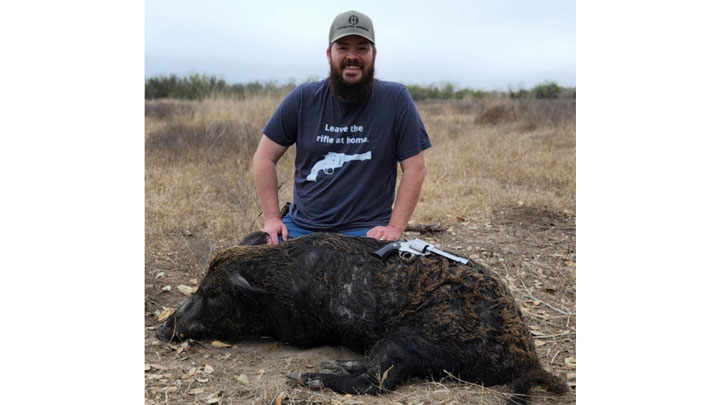
by Ryan Hoover, Director, Handgun Hunters International - Thursday, February 9, 2023

I suffer from anxiety. It didn’t affect me until I was in my late 30s, but then it hit me like a ton of bricks. Panic attacks are no fun. Fortunately, I could control my anxiety without medication through some therapy, figuring out some health issues and strengthening my faith. Part of that therapy was hunting.
First, I want to confront the elephant in the room—mental health. Modern humans, men especially, have a severe stigma attached to those two words. If you say the words “heart health,” “gut health,” “healthy diet” or any other type of health connected with our physical bodies, no one bats an eye. Start talking about mental health, though, and people fear they’ll become some pariah for attending to an essential part of our human makeup. This is the reason why I advocate for normalizing conversations about mental health, and always speak freely about my journey.
I greatly advocate for hunting as a therapy for anxiety and other mental health issues. Some aspects of hunting closely mimic other therapeutic forms that are well known for their ability to help relieve anxiety and symptoms of post traumatic stress disorder (PTSD). Hunting almost always involves some form of exercise, the benefits of which are widely known to help with every aspect of health. Hunting also includes many of the same features as meditation. Being in the woods, waiting for the sun to come up or game to walk by, offers the opportunity to quiet your mind and reflect. It offers an excellent opportunity for some prayer time.
Shooting also has some meditative qualities, counterintuitive as that may seem. Many shooting coaches have mentioned that shooting is a “mind game” or something like it. What I take that to mean is that while my ability to shoot well is undoubtedly connected to my physical ability, it is just as much of a mental exercise. Anyone who has ever had to overcome a flinch or target panic or suffered from “buck fever” knows this well. Having experienced target panic, a problem that severely affects shooting, I have had to practice the mental aspect of shooting far more than the physical.
Hunting also provides some opportunities for confronting anxiety and learning to deal with it in a healthy way. This manifests itself in different ways. First, there’s the anxiety of whether your hunt will be successful. This is low-level stress. Then you get to the stress and excitement caused when you see an animal. Will it present a shot opportunity? Is it the animal you’re targeting? Will you make a good shot? By confronting these stressors and successfully overcoming them, you are developing general skills that will benefit you all of your life.
But while success in the field breeds confidence, but what about failure? If you hunt, you will have unsuccessful hunts. You will go without seeing the animal you seek or even any animal at all. You will make a less-than-ideal shot, need to track the animal, and second-guess your decisions in the field. You may lose a wounded animal. This can cause anxiety for sure. The good thing, in my experience, is that this anxiety is specific. By being able to trace a specific cause for your anxiety, you may find it easier to deal with. I do.
Every “failure” I’ve had in the field, such as from missing it, has resulted in my ultimate improvement. By being able to analyze myself and what went wrong, I have gained valuable insight into the way my anxiety manifests itself. This led to me developing skills to maintain confidence and persevere even when stressed. I am not perfect at this, but I am improving.
Whether or not you deal with anxiety, attending to your mental health is important. Think of it as going to the gym for your mind. When you’re in the field, be sure to take advantage of the opportunities you’ll have for mindfulness and for developing healthy mental habits.
Everything I have written here is based on my own personal experiences. I am not a mental health professional. None of what I say here is intended to diagnose or treat anything. Hunting may not be right for everyone, and you should consult your mental health professional before proceeding.
About the Author
Ryan Hoover is the director of Handgun Hunters International (HHI), where he works to promote the benefits of handgun hunting as a way to help overcome life’s challenges. His background includes serving as a U.S. Navy firearm instructor and 15 years as a custom gun builder. As someone who enjoys helping new handgun hunters get started, he spends time teaching gun safety to entire families, nose-to-tail use of game meat and hunting as a therapy for various mental health issues. He can be reached at: [email protected].

About the Voice of Leadership Panel
The Voice of Leadership Panel is an appointed group of outdoor industry leaders who have volunteered to contribute their voices on key hunting and outdoor recreation issues to inform, inspire and educate participants within our community. Panelists for 2023 include:
E-mail your comments/questions about this site to:
[email protected]
Proudly supported by The NRA Foundation and Friends of NRA fundraising.
